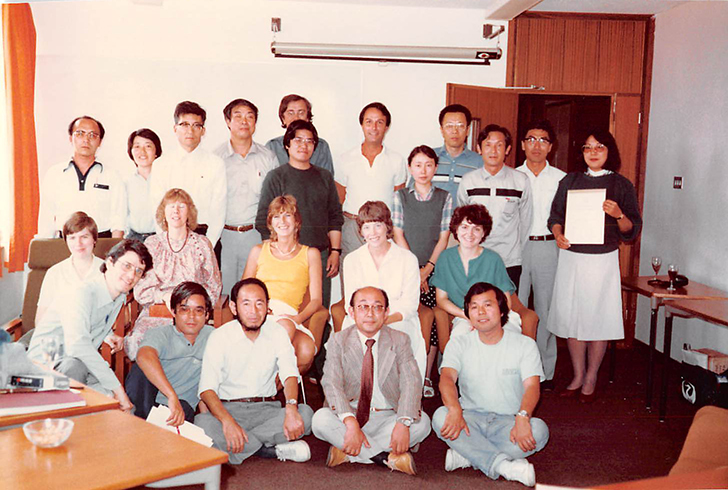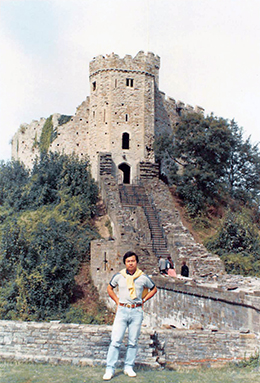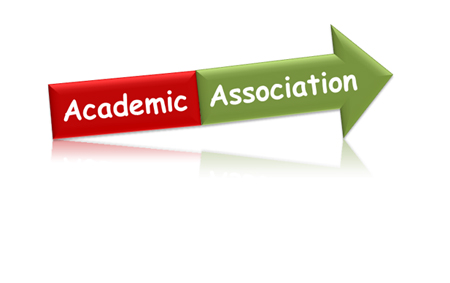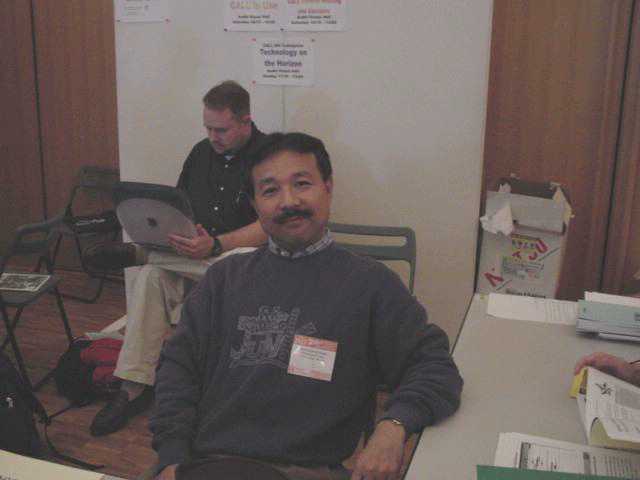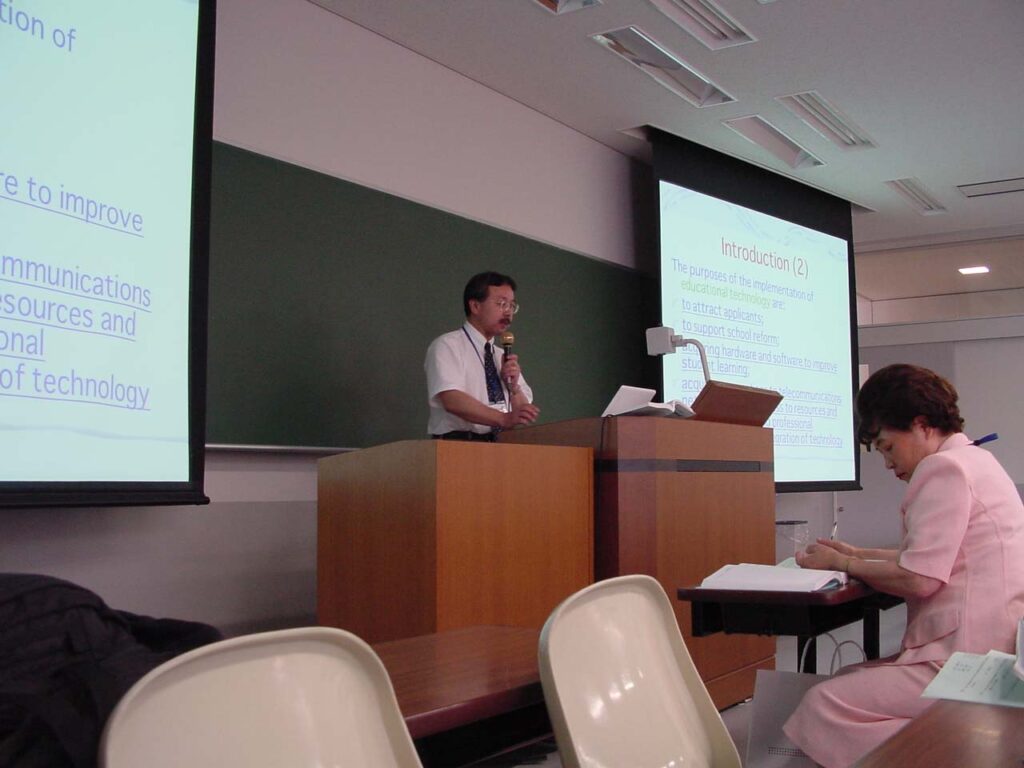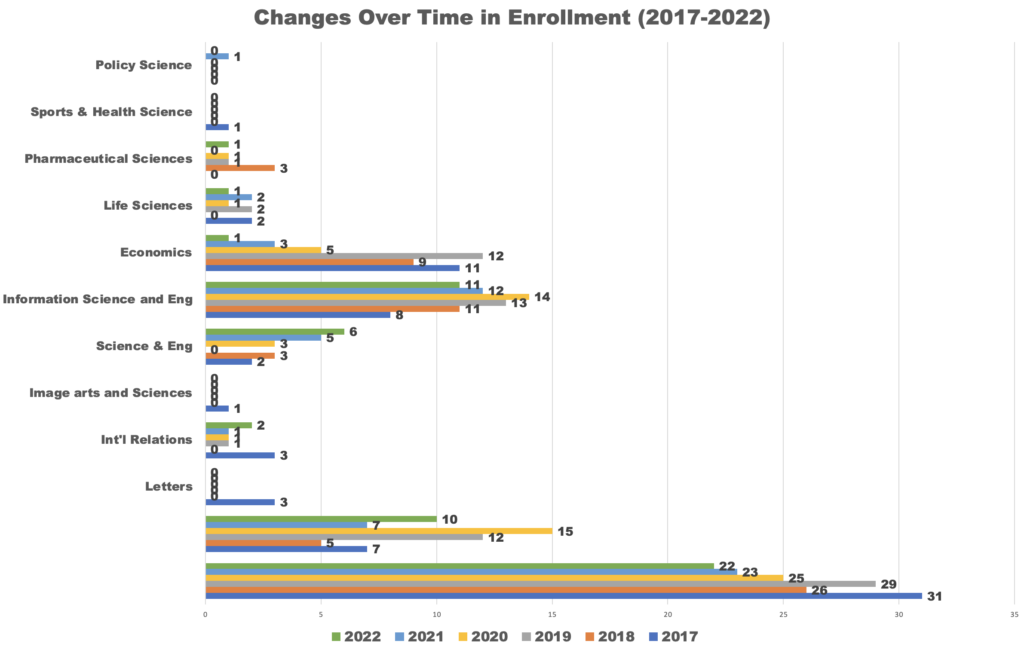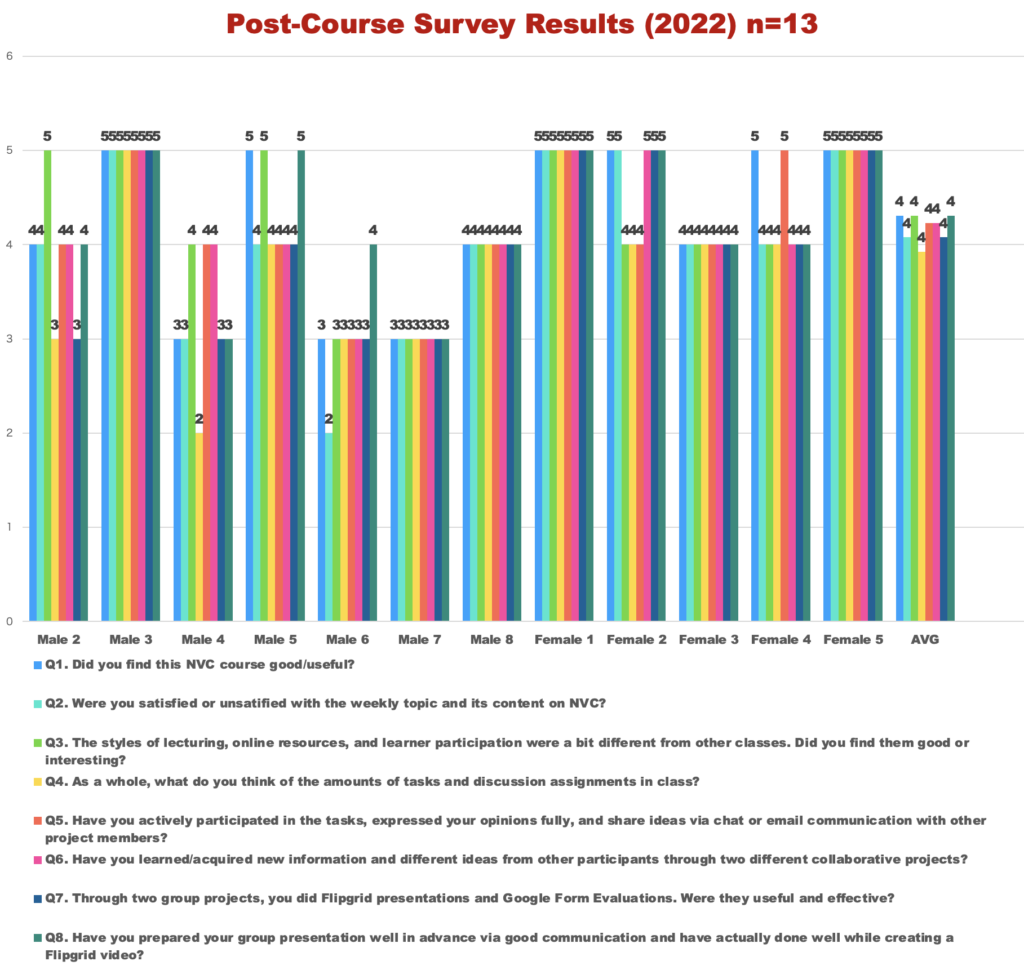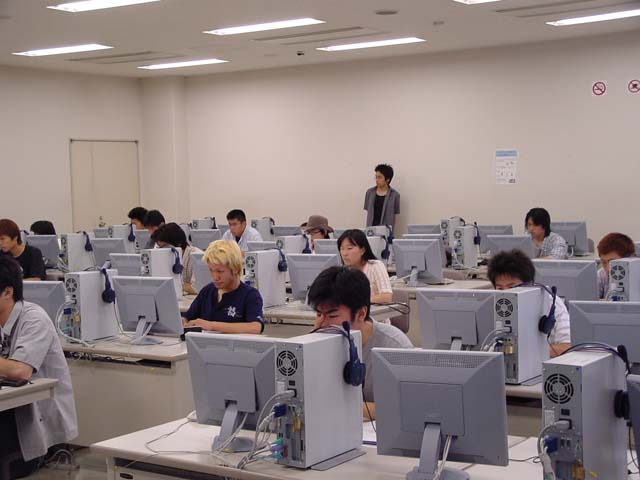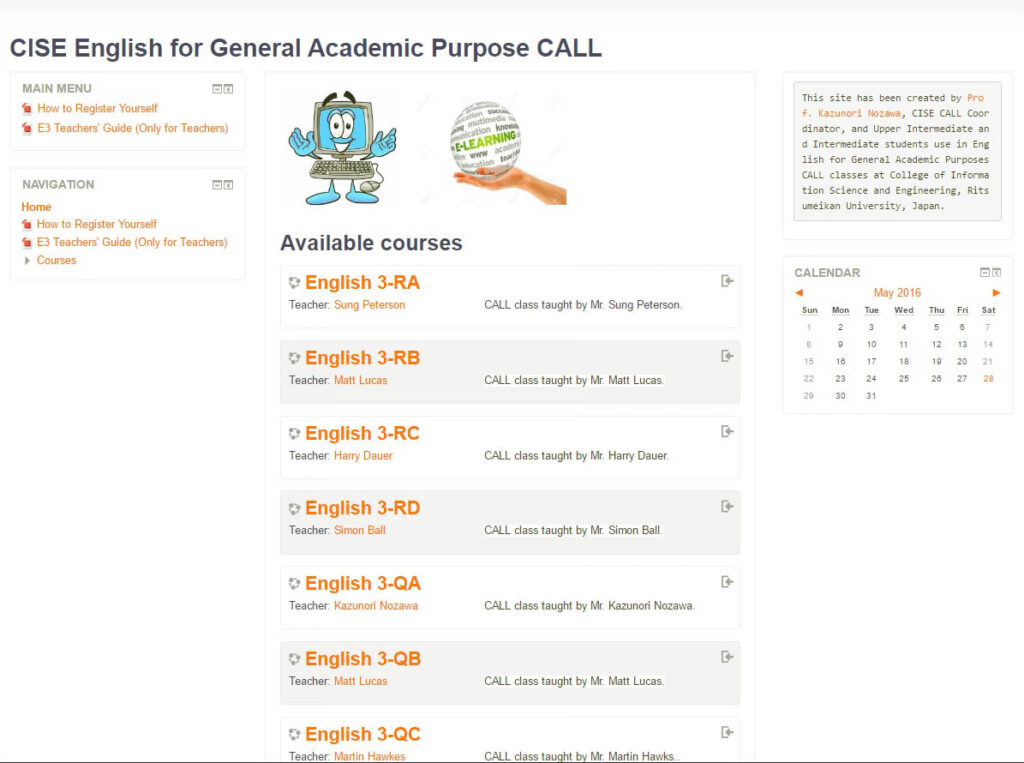私的な初めての海外渡航は全てが初めての海外滞在経験であったこともあり、まだ自分の英語力に自信がなかったので、安心して行けるという気持ちが強かったため、観光地で有名な米国のハワイ(オワフ島)となった。その結果、大学4年生であった夏休みに参加できる日本旅行が企画した英語夏季研修4週間プログラムにした。ホノルル市内にあるキッチン付きのアパートメントにて現地で初めて知り合った他大学(日本大学生3名と慶應義塾大学生1名)と一緒に共同滞在し、バスを利用してハワイ大学マノアキャンパス(University of Hawaii Manoa)に行き、午前中英語研修を受けるというものであった。授業を担当していた英語教師は地元の高校で外国語としての英語を担当している教員だったと記憶している。
英語の授業が午前中のみだったこともあり、同じ研修プログラムに参加していた日本女子大学の女子学生たち数人とも仲良くなり、特に週末にはレンタカーを借りて、交代で運転をして、いわゆる観光名所に出かけたりして、初めてのハワイ旅行を楽しんだ。ハワイ島やカウアイ島など他の島に行く余裕はなかったが、オアフ島での滞在を目一杯楽しんだと思う。英語力がどれほど伸びたかも不確かだが、当時ハワイ大学に留学していた某日本人学生と話す機会があり、まだまだ英語力のブラッシュアップをしなければならないが、大学卒業後の本格的な大学院留学を実現する気持ちが高まった。
宇都宮大学を卒業後は正規留学をしたいと計画していたため、自宅に住み続けた一方、米国留学への資金的なサポートを得られるという賛同を得てはいたものの、各種のアルバイトをしながら多少の留学準備金を貯めたりした。大学生4年次に教員試験も受けず、全く就職活動をしなかったので、フリーターとなった。インターネットのない時代であったため、時折普通列車で片道2時間以上かかりながら、東京のアメリカ大使館図書館へ行き、留学する大学院について調べたり、あちこちの大学から願書を取り寄せたりした。いくつかの大学院に応募するかを決めてからは、エアメイルで送受信し、正規大学院留学を目指すための入学許可を得るには1年ぐらいはかかると思い、その準備をしていた。当然、自分の英語力を向上させる必要もあり、TOEFL受験を何度かして、入学許可を得る必要な990点中最低点550点をクリアすることも必要であった。地元の宇都宮市には適当な語学学校や英語学習集中プログラムはなかったので、東京の小さな英語学校(具体的な学校名や所在地は忘れてしまった)でミシガンメソッドによる1日5時間の英語集中学習プログラムの3ヶ月間コースを受講した。当時サッカーが強く、憧れて入学し、東京の私立高校に通学していた弟が住む板橋区の同じアパートの共同キッチンおよび共同トイレで風呂無しの6畳一間という悲惨な住環境であったが、3ヶ月間住みながらその学校に通学した。毎日地元の銭湯や商店街で食材の購入して、それなりに東京での生活は楽しめたかもしれない。
最終的に5つの大学院に応募したが、その入学許可がなかなか来ないので、毎月入学でき、学生ビザを発行してくれる全米各地にあったELS Language Centerという英語学校に入学し、英語力をさらにアップしながら入学許可を待つことにして、9月末に2回目の渡米をした。渡米先はカリフォルニア州オークランド市にあるローマ・カトリック系の私立大学のホーリー・ネームズ大学(Holy Names University)に併設されていたELS Language Center(現在は存在しない)で、3ヶ月間の集中英語プログラム(毎日5時間週5日間で1ケ月単位でレベルチェックがなされるプログラム)を修了した後、応募した中西部の5つの大学院のうち、最初に入学許可をくれたカンサス州ローレンス市にあるカンサス大学大学院(言語学部)へ入学した。しかし、途中で先行を教育学部のCurricuramu & Instructionに変更したり、TAで日本語教育に携わったので、計3年に及ぶ長期留学スタイルとなった。
My first overseas trip was to Hawaii (Oahu) in the U.S., a famous tourist destination. It was my first experience staying in a foreign country, and I was not yet confident in my English skills, so I had a strong feeling that I could go there without worry. As a result, I decided on a 4-week English summer program organized by Nippon Travel Agency, which I could participate in during the summer vacation when I was a senior in college. I stayed in an apartment with a kitchen in Honolulu with three Nihon University students and one student from Keio University, whom we met for the first time in Honolulu. In the morning, we took a bus to the University of Hawaii Manoa campus for an English course. The English teacher in charge of the class was a temporary hired teacher. I remember that the English teacher in charge of the class was a teacher in charge of English as a foreign language at a local high school.
Since English classes were held only in the morning, I and roomates became friends with several female students from Japan Women’s University who were also participating in the training program. We enjoyed our first trip to Hawaii, especially on weekends when we rented a car and took turns driving to so-called tourist attractions. Although we did not have time to visit other islands such as Big Island and Kauai, I think we enjoyed our stay in Oahu to the fullest. I was uncertain how much my English skills have improved, but I had a chance to talk with a certain Japanese student who was studying at the University of Hawaii at the time, and although I still need to brush up my English skills, it has increased my desire to realize a full-fledged graduate school study after graduating from the university.
Since I had planned to study abroad full-time after graduating from Utsunomiya University, I continued to live at home while also working various part-time jobs to save some money to prepare for study abroad, although I had received approval to obtain financial support for my study in the U.S. In his fourth year as a university student, he did not take the teaching examination and did not look for a job at all, so he became a freelancer. Since the Internet was not available in those days, I sometimes took a local train to the library of the U.S. Embassy in Tokyo, which took more than two hours one way to research graduate schools to study abroad, and to order application forms from many different universities. After deciding which of several graduate schools to apply to, I sent and received them by airmail and prepared for the year or so it would take to gain admission to pursue formal graduate study. Naturally, I also needed to improve my English skills and take the TOEFL test several times to clear the minimum score of 550 out of 990 required to gain admission. There was no suitable language school or intensive English study program in my hometown of Utsunomiya, so I enrolled in a three-month course at a small English school in Tokyo (I forget the specific name and location of the school) that offered a five-hour-a-day intensive English study program using the Michigan Method. I was a strong soccer player at the time, so I enrolled in the school and commuted to the school while living in a miserable 6-mat room with no bathroom and a shared kitchen and toilet in the same apartment in Itabashi Ward where my younger brother, who was attending a private high school in Tokyo, lived. I went to school while living there for three months. I might have enjoyed my life in Tokyo to some extent, as I went to the local public baths and bought food at the local shopping street every day.
I finally applied to five graduate schools, but since the admissions were not forthcoming, I decided to enroll in an English language school called ELS Language Center, which offered monthly enrollment and issued student visas in various locations in the U.S., and waited for a formal admission while further improving my English language skills. I went to the U.S. for the second time at the end of September. The destination was the ELS Language Center (which no longer exists), which was attached to Holy Names University, a private Roman Catholic university in Oakland, California, and offered a three-month intensive English program (5 hours per day, 5 days per week). After completing the three-month intensive English program at the ELS Language Center, I entered the graduate school (Department of Linguistics) at the University of Kansas in Lawrence, Kansas, which was the first of the five graduate schools in the Midwest to which I applied and to which I was admitted. However, I changed my dmajor to Curricuramu & Instruction in the School of Education midway through the program and worked as a TA in Japanese language education, so it became a long-term study style that lasted a total of three years.
